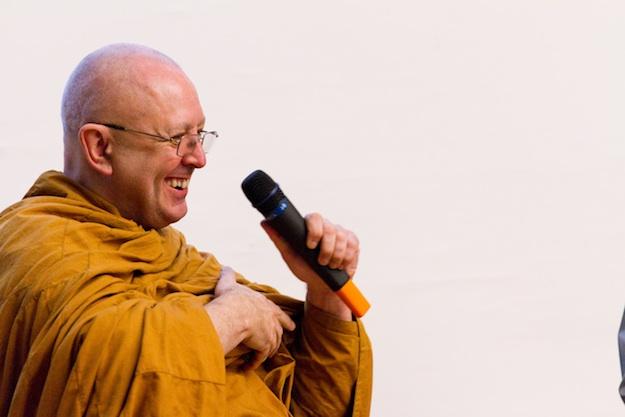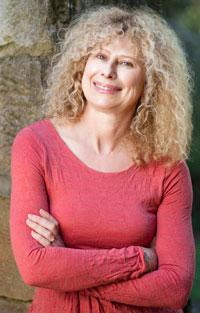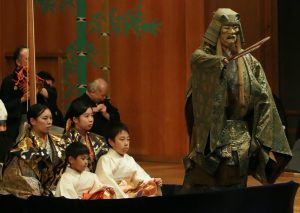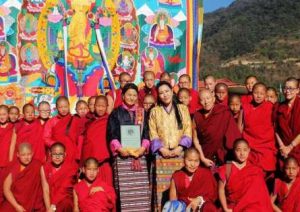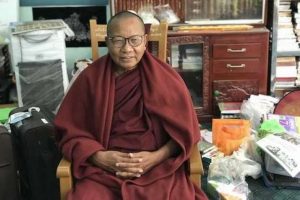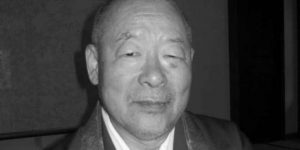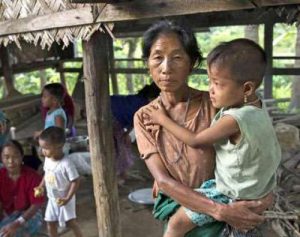A Forest Monk – An Interview with Ajahn Brahmavamso
This interview is an excerpt from: A Forest Monk and a Zen Roshi
Radio National (Australian Broadcasting Corporation) – The Spirit of Things
Ajahn Brahmavamso is the Abbot of the Bodhinyana Buddhist Monastery in Western Australia, and Spiritual Director of the Buddhist Society of Western Australia. He trained as a monk in the Thai Theravada tradition under the guidance of the renowned meditation master Ajahn Chah.
Dr. Rachael Kohn (interviewer): Finding peace in the fast lane of the entertainment world is quite different from the kind of life that Ajahn Brahmavamso chose as a young man. Born in London and educated in Theoretical Physics at Cambridge University, he became a Buddhist monk in the Thai Forest tradition of Ajahn Chah. Now the Abbot of Bodhinyana Monastery, in Serpentine, Western Australia, he’s in demand as a speaker and is known for his story telling.
Although simplicity is the essence of monastic life, and that’s particularly so in the rural setting of Serpentine, the whole point of Buddhist insight is to find tranquility in the midst of chaos. And that’s how it was when I caught up with Ajahn Brahm in the Bodhikusuma Buddhist and Meditation Centre located in the noisy inner city suburb of Chippendale in Sydney, where the transport trucks rumbled by just outside the door.
< PART 1 of 2 >
RK: Ajahn Brahm, you’ve been a monk for some years now… since you were 23?
AB: When I was 23, I decided I’d had enough of the world and became a monk. I used to be a schoolteacher before, and that’s enough to make anyone leave the world and become a monk.
RK: Now I thought you had been studying physics at Cambridge University.
AB: Yes, that was before I became a schoolteacher. I thought I’d do something good with my life, instead of making bombs or things like that. And so I decided to try school teaching. However, after a while the whole feeling for a monastic life, or for something spiritual, was very strong inside of me. And one of the lovely things about Buddhist monastic life, in the Thai tradition was you can become a monk just for a short time.
So I decided I would take a couple of years off my career life, and then go off to Thailand, become a monk, get it out of my system, and then go back to the world again. But once I became a monk, something happened very quickly that I realized that’s what I always wanted to do, I felt so comfortable in the role of a monk.
RK: Were you actually taking refuge as it were, away from the school life, I mean teaching children? What was it that really made you take quite a radical step.
AB: OK, what really made me take that step was a realization that deep inside there was much more to life than just getting on in one’s career or in relationships. Perhaps one of the most moving experiences in my life was one of my first meditation retreats. I did get into a very deep state of meditation, which was so joyful, it was so much bliss. And that never left me, and I wanted to find out what exactly that meant and how it fits in to the scheme of things. So that degree of deep meditation was something, which changed a lot of perspectives on the meaning of life. I wanted to explore those perspectives more, and that could only be done in monastic life.
RK: Well the description you give of life in Thailand doesn’t exactly sound joyful. I mean you spent a lot of time building monasteries, in fact I think it totals to about 20 years building monasteries, in rather difficult circumstances.
AB: It was difficult physically, building the monasteries, but there was always a lot of fun around, and it was done joyfully. For example one of my stories was when we were building the main hall in my teacher Ajahn Chah’s monastery, there was a lot of earth left over and we had to move that earth from one place to another because Ajahn Chah, my teacher, said it didn’t look good over there.
It took three whole days of very hard work from 9 o’clock in the morning until about 10pm with hardly any breaks. We’d already eaten our meal for the day, and that was one day after the other in the tropical heat. When we were finished, we were very happy but then Ajahn Chah left for another monastery. The following morning, his deputy abbot came up to us and said he thought the soil was in the wrong place and we had to move it. So for another three days we moved it to another spot, and again I was very happy when it was all finished.
But the next day, Ajahn Chah came back and he said, ‘What did you put the soil over there for, I told you to leave it over here.’ And so for another three days we had to move the soil again. And of course by this time I was getting very angry and upset. And being a Westerner, in an Asian monastery, I could swear in English without anyone understanding. But they did understand because they could see my body language.
And I always remember one monk coming up to me and saying, ‘It’s pushing the wheelbarrow is easy, it’s the thinking about it which is hard.’ And that’s changed the whole perspective of what I was doing. As soon as I stopped complaining and moaning, it was easy to push that wheelbarrow; in fact it felt much lighter. And this is actually how I learned about the secrets, one of the secrets, of monastic life. Didn’t matter what you were doing, whether you were sitting for hours and hours and hours in your hut, whether you were working building a monastery, there’s a thinking about it, which made it hard.
RK: Well it also sounds like one of the secrets of monastic life is learning how to take orders. I mean it’s positively torture, isn’t it? To be told to do one thing and then to undo it and then re-do it again?
AB: Well sometimes. If you look from my perspective it seems like it should be; look from another perspective, it wasn’t at all. It was just again, one can make anything torture, one could make sort of eating torture, or being interviewed torture, but it’s one’s attitude which is the most important thing, and this is one of the things you really found in monastic life, it’s how you approached it. And a lot of times you had a choice. If you were going to keep those old silly ways of looking at life, then you would suffer. But if you actually changed the way you looked at life, in other words you did learn some wisdom; you find it was no problem at all.
RK: Were you always interested in your attitude to things? I mean were you always a kind of perfectionist, to try to find just the right sort of happiness, because when I think of happiness and most of us are quite content with some happiness and some unhappiness, you know the combination is what life delivers in most cases. But you seem to be going for the kind of almost magical solution to find happiness in all things.
AB: Correct, yes, because I always thought that the search for happiness is the underlying force of life. No matter what we’re doing in our world, in our life, it’s always a search for some sort of happiness. Then again, one of those early experiences of deep bliss in meditation gave me a taste of some happiness, which was out of this world. And so once you’ve tasted that you wanted to make even a deeper search into the meaning of happiness.
The meaning of happiness is the meaning of life. And so it wasn’t just the meaning of happiness in meditation, it was also the meaning of happiness in anything you were doing. Because even sometimes your body gave you orders in saying, ‘Now you have to sleep’ or ‘Now you have to be sick’ or ‘Now you can’t do what you want’. So it didn’t matter whether there was something else in life, which stopped you doing what you wanted to do. That was like the orders of life, and you had a chance there to actually let go, to surrender to the moment when you can’t change things, and be content. And that’s one of the wonderful things that I found in Buddhist practice. You can be happy, no matter what’s going on.
RK: In fact you tell a story about going to a prison and speaking to prisoners, where you described your life to them, and they’re so shocked, they actually say, ‘Gee, come and live with us, it’s a lot nicer here than a monastic life’. In fact stories are quite important to you, in the way that you communicate.
AB: Life is lived in stories, not in thoughts. Thoughts are almost like a second-hand report of what actually happens in your life. So if you can take the stories of life and illustrate from them the meanings of life, I think people can relate to it much more easily. So I like those stories.
Just to actually complete that story which you only mentioned in part when one of my monks, it wasn’t myself, another monk was teaching in jail, after the session they asked him about what it was like in a Buddhist monastery in the West, and we told him we get up so early in the morning, 3 o’clock in the morning and then we have to go to this cold hall to sit for hours cross-legged, meditating, and doing some chanting. And then only afterwards, maybe at 6.30, we might get a cup of tea, and then you have to work for three or four hours, hard work, before you can get some lunch. And that lunch is just what you’re given, you’ve got no choice, and it’s all eaten in one bowl, all mixed together. So it’s not very delicious at all. And in the afternoon it’s usually more work in those days. And then you can’t watch the television, there is no television or radio, and you can’t follow sport, you can’t play sports, you can’t play music or listen to music. There’s no movies to watch, and there’s nothing in the evening, you can’t eat in the evening, except just to go to the main hall and to sit in more meditation, cross-legged on the hard floor for hours, and when you do go back to your hut to sleep, it’s on the floor, in the cold.
And so when I said this, or when this monk said this, the prisoners were very shocked, and this is when one of the prisoners forgot where they were and said, ‘That’s disgusting, that’s terrible, that’s awful; why don’t you monks come and live in here with us, in the jail?’ which was crazy, they forgot where they were. But the important part of that story was the reason why my monks and other people who visit the monastery like to stay there, and it’s because they’re content, they don’t look upon a monastery as a prison, simply because it’s where they want to be. Whereas prisoners in a jail, because they don’t want to be there, therefore it is a prison.
– Continued –
Part 2 of 2: http://mingkok.buddhistdoor.com/en/news/d/24479


